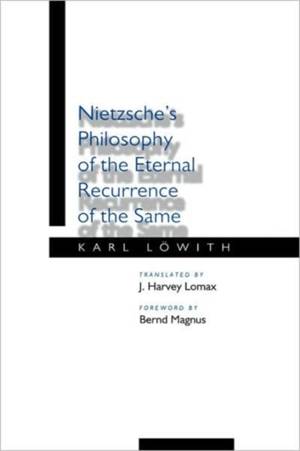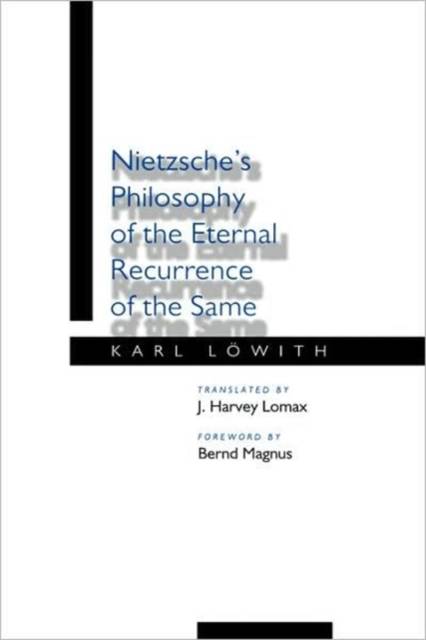
Bedankt voor het vertrouwen het afgelopen jaar! Om jou te bedanken bieden we GRATIS verzending (in België) aan op alles gedurende de hele maand januari.
- Afhalen na 1 uur in een winkel met voorraad
- In januari gratis thuislevering in België
- Ruim aanbod met 7 miljoen producten
Bedankt voor het vertrouwen het afgelopen jaar! Om jou te bedanken bieden we GRATIS verzending (in België) aan op alles gedurende de hele maand januari.
- Afhalen na 1 uur in een winkel met voorraad
- In januari gratis thuislevering in België
- Ruim aanbod met 7 miljoen producten
Zoeken
€ 116,95
+ 233 punten
Omschrijving
This long overdue English translation of Karl Löwith's magisterial study is a major event in Nietzsche scholarship in the Anglo-American intellectual world. Its initial publication was extraordinary in itself--a dissident interpretation, written by a Jew, appearing in National Socialist Germany in 1935. Since then, Löwith's book has continued to gain recognition as one of the key texts in the German Nietzsche reception, as well as a remarkable effort to reclaim the philosopher's work from political misappropriation.
For Löwith, the centerpiece of Nietzsche's thought is the doctrine of eternal recurrence, a notion which Löwith, unlike Heidegger, deems incompatible with the will to power. His careful examination of Nietzsche's cosmological theory of the infinite repetition of a finite number of states of the world suggests the paradoxical consequences this theory implies for human freedom. How is it possible to will the eternal recurrence of each moment of one's life, if both this decision and the states of affairs governed by it appear to be predestined? Löwith's book, one of the most important, if seldom acknowledged, sources for recent Anglophone Nietzsche studies, remains a central text for all concerned with understanding the philosopher's work.
For Löwith, the centerpiece of Nietzsche's thought is the doctrine of eternal recurrence, a notion which Löwith, unlike Heidegger, deems incompatible with the will to power. His careful examination of Nietzsche's cosmological theory of the infinite repetition of a finite number of states of the world suggests the paradoxical consequences this theory implies for human freedom. How is it possible to will the eternal recurrence of each moment of one's life, if both this decision and the states of affairs governed by it appear to be predestined? Löwith's book, one of the most important, if seldom acknowledged, sources for recent Anglophone Nietzsche studies, remains a central text for all concerned with understanding the philosopher's work.
Specificaties
Betrokkenen
- Auteur(s):
- Vertaler(s):
- Uitgeverij:
Inhoud
- Aantal bladzijden:
- 308
- Taal:
- Engels
Eigenschappen
- Productcode (EAN):
- 9780520065192
- Verschijningsdatum:
- 20/08/1997
- Uitvoering:
- Hardcover
- Formaat:
- Genaaid
- Afmetingen:
- 158 mm x 235 mm
- Gewicht:
- 594 g

Alleen bij Standaard Boekhandel
+ 233 punten op je klantenkaart van Standaard Boekhandel
Beoordelingen
We publiceren alleen reviews die voldoen aan de voorwaarden voor reviews. Bekijk onze voorwaarden voor reviews.









